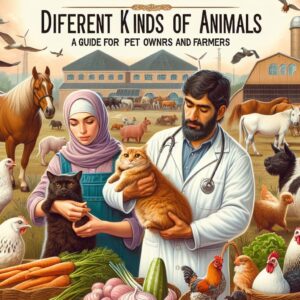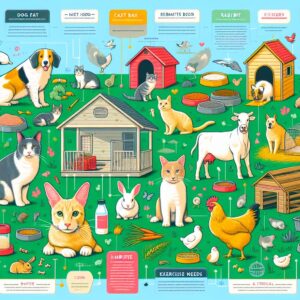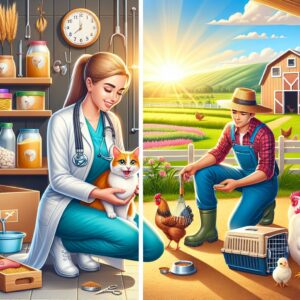From the tiniest of companion animals to the largest livestock on the farm, providing proper care for animals is essential to their health and well-being. Whether you are a proud pet owner or a diligent farmer, it is important to understand the unique needs of different animals and how to meet them. In this article, we will explore some tips and guidelines for caring for various types of animals, ensuring they lead happy and healthy lives.
Pet Owners: Nurturing our Beloved Companions
As pet owners, we have the privilege of sharing our lives with animals that bring immense joy and unconditional love. To ensure the well-being of our furry friends, providing proper nutrition, regular exercise, and mental stimulation is crucial. Diet should consist of high-quality pet food tailored to the specific needs of the individual animal. Consult your veterinarian for recommendations on the right food and portions.
Just like humans, regular exercise is essential for pets to maintain a healthy weight and overall fitness. Engage in interactive play sessions or take your dog for daily walks to keep them active and happy. Mental stimulation is equally crucial, especially for intelligent breeds. Toys, puzzles, and training sessions help keep their minds sharp as well as strengthen the bond between you and your pet.
In addition to proper diet and exercise, ensuring regular veterinary check-ups and vaccinations is vital for your pet’s health. Annual visits to the vet allow early detection of any potential health concerns and ensure timely interventions. Keeping up with vaccinations can prevent various diseases that could be harmful to both your pet and other animals they come in contact with.
Farmers: The Lifeline of Livestock
For farmers, the proper care of livestock is not only important for the animals themselves but also for the success of the farm. When it comes to the health of livestock, there are a few key areas to focus on – nutrition, shelter, and disease prevention.
Providing a balanced and nutritious diet is essential for the overall health and productivity of farm animals. Consult a livestock nutritionist to ensure that you are meeting the specific nutritional needs of your animals. Fresh water should always be readily available and easily accessible to keep livestock hydrated, particularly in hot climates.
Creating suitable and comfortable shelter for animals is crucial, especially during extreme weather conditions. Adequate space and proper ventilation are essential to prevent health issues. Regular cleaning of facilities and bedding are necessary to maintain hygienic and comfortable conditions, reducing the risk of infection and diseases.
Disease prevention is another vital aspect of livestock care. Regular vaccinations, deworming, and herd health monitoring should be implemented in consultation with a veterinarian. Early detection and prompt treatment of any signs of illness can significantly reduce the risk of further health complications and prevent the spread of contagious diseases among the livestock.
Caring for Injured Animals in the Wild
Aside from domestic pets and farm animals, it is inevitable to encounter injured animals in the wild. While it is important to treat them with care, it is equally essential to know when and how to intervene. In the case of minor injuries, it is often best to observe from a distance, allowing nature to take its course. However, if you encounter an injured wild animal in immediate danger or unable to move, contacting your local wildlife rescue or rehabilitation center is the best course of action. These experts have the necessary experience and resources to assess and handle the situation appropriately.
Conclusion
Whether you are a pet owner tasked with the unconditional love and well-being of your beloved companion, or a farmer nurturing livestock that supports both your family and the community, proper care for animals is essential. By providing proper nutrition, regular exercise, and mental stimulation to pets, and focusing on nutrition, shelter, and disease prevention for livestock, you can create a happy and healthy environment for all creatures. Understanding when and how to care for injured animals in the wild allows us to help, while also respecting the natural order of things. Let us cherish the animals in our lives and strive to be the best caretakers we can be.



